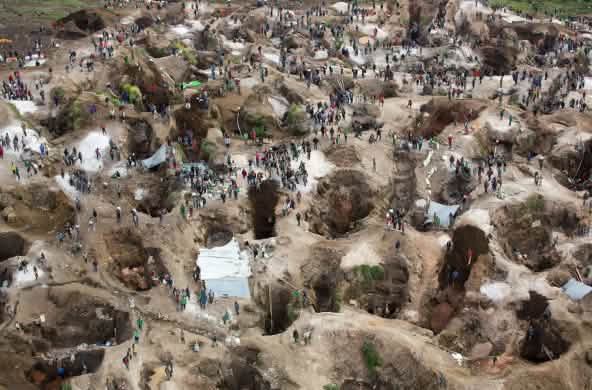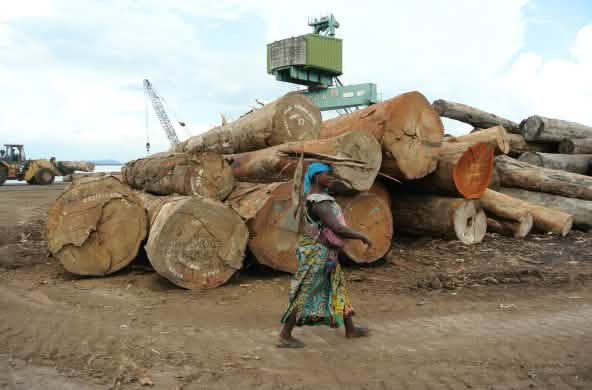Completed campaign
A cry for help from West Africa: save us from extinction!
The future looks grim for the critically endangered western chimpanzee. Protected areas are urgently needed to stop their habitat from shrinking further. Please lend our closest kin your voice and tell the governments of West Africa to do everything they can to save them.
News and updatesTo: the governments of Liberia, Guinea and Sierra Leone (Ghana, Guinea Bissau, Mali, Senegal and Côte d'Ivoire)
“The future looks grim for the critically endangered western chimpanzee. Please do everything possible to protect them from extinction.”The International Union for Conservation of Nature (IUCN), which publishes the Red List of endangered species, recently classified the western chimpanzee (Pan troglodytes ssp. verus) as “critically endangered”.
“This is a wakeup call for us. We need to do more to protect primates,” explains Professor Christophe Boesch. As the director of the Department of Primatology at the Max Planck Institute for Evolutionary Anthropology in Leipzig, Germany, Boesch took part in the study that was the basis for their classification.
Chimpanzees have been pushed back into tiny, isolated fragments of their original habitats. Across West Africa, the landscape is increasingly dominated by the cultivation of oil palms, rubber, coffee and cocoa. Loggers are clearing the forests at an alarming rate while mining companies rip deep gashes into the land. Chimpanzee meat can be found on markets together with other varieties of bush meat.
While humans have shown little regard for the welfare of chimpanzees in the past, researchers are documenting just how closely related we are: chimpanzees mourn their dead, adopt orphans, use a variety of tools and have their own cultural traditions.
The only way to ensure the survival of chimpanzees is to create adequate protected areas. Liberia, for example, has pledged to preserve 30 percent of its forests by the year 2030. To date, only six percent have been protected, however. The situation is similar – or worse – in other countries with chimpanzee populations.
People are increasingly recognizing that more needs to be done to protect chimpanzees and the rainforest. International pressure can persuade governments to act quickly to designate protected areas and keep them safe.
Please give chimpanzees – our wild cousins – your voice and sign our petition.
Four of six great ape species are facing extinction
In September 2016, scientists of the IUCN classified four of the six great ape species as “critically endangered” and thus one step away from extinction: the Bornean and Sumatran orangutans, and the eastern and western gorillas.
All four subspecies of chimpanzee (Pan troglodytes) are listed as “endangered” at best, while the western chimpanzee (Pan troglodytes ssp. verus) is “critically endangered”.
The bonobo (Pan paniscus) is listed as “endangered”.
Africa’s gorillas are on the brink
The population of eastern gorillas (Gorilla beringei), of which there are two subspecies, has declined by more than 70 percent within a mere 20 years.
Of the eastern lowland gorilla subspecies (G. b. graueri), there were 16,900 individuals in 1994; in 2015, only 3,800 remained – a decline of 77 percent. 880 mountain gorillas (G. b. beringei) remain – a slight increase. The greatest threat to gorillas is poaching.
Both western gorilla subspecies – the western lowland gorilla and the Cross River gorilla (G.g. ssp. gorilla and G.g. ssp. diehli) – are also listed as “critically endangered”.
Orangutans threatened by oil palm plantations
Orangutans on Sumatra and Borneo are also on the verge of extinction. On Sumatra, 60 percent of orangutans’ habitat was destroyed between 1985 and 2007. Experts estimate the number of individuals to be around 14,000, most of whom live in the Leuser Ecosystem.
Borneo was home to 288,500 orangutans in 1973; according to IUCN estimates, only 47,000 will remain by 2025. That is a drop of 84 percent.
Orangutan females only give birth every six to eight years, so the dramatic decline will be hard to stop even with effective protection.
Living World Heritage
Animal rights activists are calling for the United Nations to recognize the great apes as a “Living World Heritage”. Rainforest Rescue supports these efforts.
To: the governments of Liberia, Guinea and Sierra Leone (Ghana, Guinea Bissau, Mali, Senegal and Côte d'Ivoire)
Ladies and Gentlemen,
The International Union for Conservation of Nature (IUCN), which publishes the Red List of endangered species, recently classified western chimpanzees as “critically endangered” – one step away from extinction.
Western chimpanzees have already disappeared from Benin, Burkina Faso and Togo. Please ensure that they do not meet the same fate in your country!
This worrying development has several causes:
- Most primate habitat is not protected.
- Their habitat is being destroyed for the cultivation of oil palms, rubber, coffee and cocoa. A particular cause for concern is the fact that their habitat coincides to a large extent with areas that are potentially suitable for oil palm plantations.
- Logging and mining companies are devastating their habitat.
- Chimpanzee meat can be found on markets together with other varieties of bush meat. The trade in live animals also plays a role.
While humans have shown little regard for the welfare of chimpanzees in the past, researchers are documenting just how closely related we are: chimpanzees mourn their dead, adopt orphans, use a variety of tools and have their own cultural traditions.
We call on you to recognize your special responsibility for the survival of our wild cousins:
- Set up protected areas immediately to preserve the habitat of the animals.
- Ensure that their protection status is enforced effectively.
- Engage local people in the protection of the chimpanzees.
Please do everything possible to protect them from extinction.
Sincerely,

Golden Veroleum Liberia (GVL) is guilty of clearing richly biodiverse rainforest for oil palm plantations. This is the conclusion of a report by High Carbon Stock Approach (HCSA), an agribusiness industry organization, confirming accusations that the local population and environmentalists have been making for years. GVL destroyed more than 1,000 hectares of forest, including chimpanzee habitat.
Orphaned and formerly captive chimpanzees deserve a good life. In Liberia, a small private organization is dedicated to caring for more than 40 such primates. The dream of the animal rights activists: An island as a lifetime sanctuary.
The West African country of Guinea is establishing a new forest reserve for about 4,000 chimpanzees. Moyen-Bafing National Park will cover an area of 6,426 square kilometers, making it the largest protected area for West African chimpanzees in Guinea.
Great news from Africa: Liberia recently proclaimed the new Grebo-Krahn National Park for wild chimpanzees. The habitat of more than 300 of the endangered primates is now under protection. Our friends from the Wild Chimpanzee Foundation (WCF) were the driving force behind the new park, a project partly funded by your donations!
It was a battle against mud: the first expedition into Gbi Forest in Liberia, home to a large population of chimpanzees, lasted 44 days – 27 days were originally planned. Torrential rains caused two rivers to burst their banks, turning tracks that can normally be travelled easily by motorcycle into deep wallows. Yet the long, hard slog paid off.

